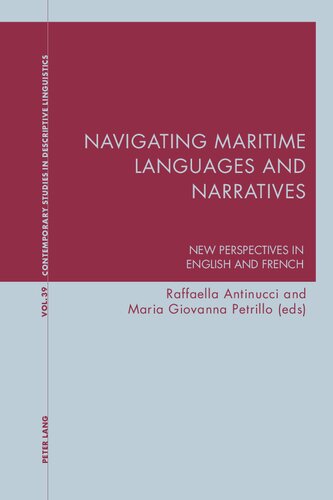

Most ebook files are in PDF format, so you can easily read them using various software such as Foxit Reader or directly on the Google Chrome browser.
Some ebook files are released by publishers in other formats such as .awz, .mobi, .epub, .fb2, etc. You may need to install specific software to read these formats on mobile/PC, such as Calibre.
Please read the tutorial at this link: https://ebookbell.com/faq
We offer FREE conversion to the popular formats you request; however, this may take some time. Therefore, right after payment, please email us, and we will try to provide the service as quickly as possible.
For some exceptional file formats or broken links (if any), please refrain from opening any disputes. Instead, email us first, and we will try to assist within a maximum of 6 hours.
EbookBell Team

5.0
68 reviewsThe book collects scholarly essays in the fields of English and French maritime terminology and sea literature. It focuses on the linguistic, literary and cultural exploration of the sea, considering new directions for research in the vast domain of «thalassology». Structured into two sections, which reflect its two main areas of enquiry (terminological and literary) and cultural standpoints (Anglophone and Francophone), the collection breaks new ground in approaching the study of the sea from different perspectives and through the use of novel methodological tools. In particular, the theoretical framework and working instruments of corpus linguistics are recurrently applied, not only to the investigation of contemporary maritime terminology but also to the interpretation of literary and musical texts, thus combining quantitative and qualitative analysis. Indeed, interdisciplinarity and dialogism inform the volume, which invites its readers to set sail on a journey across different disciplinary and linguistic seas, and to explore the protean nature of maritime terminology and imagery.
Ce volume recueille des contributions de terminologie et littérature anglaise et française dans le domaine maritime. Le but principal est d'envisager de nouvelles pistes de recherche dans le vaste domaine de la «thalassologie», d'un point de vue linguistique, littéraire et culturel. Divisé en deux sections reflétant les principaux domaines d'investigation (terminologie et littérature) dans une optique anglophone et francophone, ce volume ouvre de nouvelles perspectives dans l'étude du domaine de la mer sous différents angles et à l'aide de nouveaux outils méthodologiques. En particulier, le cadre théorique et les instruments de travail de la linguistique de corpus sont appliqués non seulement en ce qui concerne l'étude de la terminologie maritime contemporaine, mais aussi en ce qui concerne l'interprétation des textes littéraires et musicaux, combinant de cette manière l'analyse quantitative et qualitative. En effet, l'interdisciplinarité et le dialogisme sont à la base de ce volume qui invite ses lecteurs à parcourir un voyage à travers différentes nuances disciplinaires et linguistiques du domaine en question et à analyser le caractère protéiforme de la terminologie maritime et de l'imagerie.